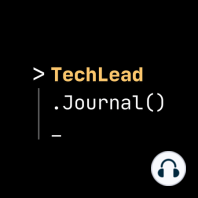59 min listen

#70 - Continuous Architecture (Part 2) - Principles, Scalability, and Performance - Pierre Pureur
#70 - Continuous Architecture (Part 2) - Principles, Scalability, and Performance - Pierre Pureur
ratings:
Length:
45 minutes
Released:
Dec 27, 2021
Format:
Podcast episode
Description
“Delay design decisions until it’s necessary. Architecture is an art, not a science. Don’t architect for things you don’t know. Your design decisions should always be built on facts, not guesses."
Pierre Pureur is the co-author of “Continuous Architecture in Practice” and an acclaimed software architect. In this second of a three-part series of “Continuous Architecture” episodes, Pierre shared his own perspectives on the 6 key principles of continuous architecture. We then discussed in-depth the two important quality attributes, which are the scalability and performance. For each quality attribute, Pierre described the attribute definition, why it is an important architectural concern, and some of the common tactics used to improve the attribute in the modern system architecture.
Listen out for:
Career Journey - [00:05:34]
Architect Products, Not Projects- [00:07:31]
Focus on Quality Attributes - [00:11:25]
Delay Design Decisions Until Necessary - [00:13:41]
Power of Small - [00:15:58]
Architect for Build, Test, Deploy, and Operate - [00:17:40]
Conway’s Law - [00:19:53]
Essential Activities - [00:23:18]
Quality Attribute: Scalability - [00:26:00]
Scalability on The Cloud - [00:28:59]
Scalability Tactic: Sharding - [00:31:01]
Scalability Tactic: Asynchronous Communication - [00:32:58]
Quality Attribute: Performance - [00:35:06]
Measuring Performance - [00:37:23]
Performance Tactics - [00:39:23]
3 Tech Lead Wisdom - [00:41:15]
_____
Pierre Pureur’s Bio
Pierre Pureur is an experienced software architect, with extensive innovation and application development background, vast exposure to the financial services industry, broad consulting experience and comprehensive technology infrastructure knowledge. His past roles include serving as Chief Enterprise Architect for a major financial services company, leading large architecture teams, managing large-scale concurrent application development projects and directing innovation initiatives, as well as developing strategies and business plans. He is coauthor of the book Continuous Architecture: Sustainable Architecture in an Agile and Cloud-Centric World (2015) and has published many articles and presented at multiple software architecture conferences on this topic.
Follow Pierre:
LinkedIn – https://www.linkedin.com/in/pierre-pureur/
Twitter – @PGP60
Website – https://continuousarchitecture.com/
Our Sponsor
Are you looking for a new cool swag?
Tech Lead Journal now offers you some swags that you can purchase online.
These swags are printed on-demand based on your preference, and will be delivered safely to you all over the world where shipping is available.
Check out all the cool swags by visiting https://techleadjournal.dev/shop.
Like this episode?
Subscribe on your favorite podcast app and submit your feedback.
Follow @techleadjournal on LinkedIn, Twitter, and Instagram.
Pledge your support by becoming a patron.
For more info about the episode (including quotes and transcript), visit techleadjournal.dev/episodes/70.
Pierre Pureur is the co-author of “Continuous Architecture in Practice” and an acclaimed software architect. In this second of a three-part series of “Continuous Architecture” episodes, Pierre shared his own perspectives on the 6 key principles of continuous architecture. We then discussed in-depth the two important quality attributes, which are the scalability and performance. For each quality attribute, Pierre described the attribute definition, why it is an important architectural concern, and some of the common tactics used to improve the attribute in the modern system architecture.
Listen out for:
Career Journey - [00:05:34]
Architect Products, Not Projects- [00:07:31]
Focus on Quality Attributes - [00:11:25]
Delay Design Decisions Until Necessary - [00:13:41]
Power of Small - [00:15:58]
Architect for Build, Test, Deploy, and Operate - [00:17:40]
Conway’s Law - [00:19:53]
Essential Activities - [00:23:18]
Quality Attribute: Scalability - [00:26:00]
Scalability on The Cloud - [00:28:59]
Scalability Tactic: Sharding - [00:31:01]
Scalability Tactic: Asynchronous Communication - [00:32:58]
Quality Attribute: Performance - [00:35:06]
Measuring Performance - [00:37:23]
Performance Tactics - [00:39:23]
3 Tech Lead Wisdom - [00:41:15]
_____
Pierre Pureur’s Bio
Pierre Pureur is an experienced software architect, with extensive innovation and application development background, vast exposure to the financial services industry, broad consulting experience and comprehensive technology infrastructure knowledge. His past roles include serving as Chief Enterprise Architect for a major financial services company, leading large architecture teams, managing large-scale concurrent application development projects and directing innovation initiatives, as well as developing strategies and business plans. He is coauthor of the book Continuous Architecture: Sustainable Architecture in an Agile and Cloud-Centric World (2015) and has published many articles and presented at multiple software architecture conferences on this topic.
Follow Pierre:
LinkedIn – https://www.linkedin.com/in/pierre-pureur/
Twitter – @PGP60
Website – https://continuousarchitecture.com/
Our Sponsor
Are you looking for a new cool swag?
Tech Lead Journal now offers you some swags that you can purchase online.
These swags are printed on-demand based on your preference, and will be delivered safely to you all over the world where shipping is available.
Check out all the cool swags by visiting https://techleadjournal.dev/shop.
Like this episode?
Subscribe on your favorite podcast app and submit your feedback.
Follow @techleadjournal on LinkedIn, Twitter, and Instagram.
Pledge your support by becoming a patron.
For more info about the episode (including quotes and transcript), visit techleadjournal.dev/episodes/70.
Released:
Dec 27, 2021
Format:
Podcast episode
Titles in the series (100)
#5 - Infrastructure as Code - Kief Morris by Tech Lead Journal